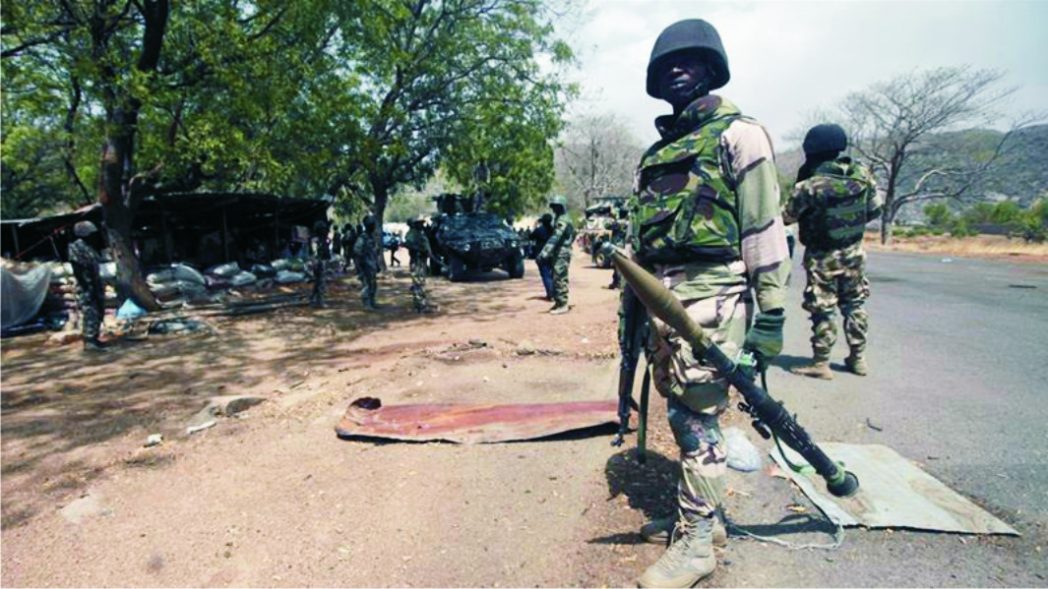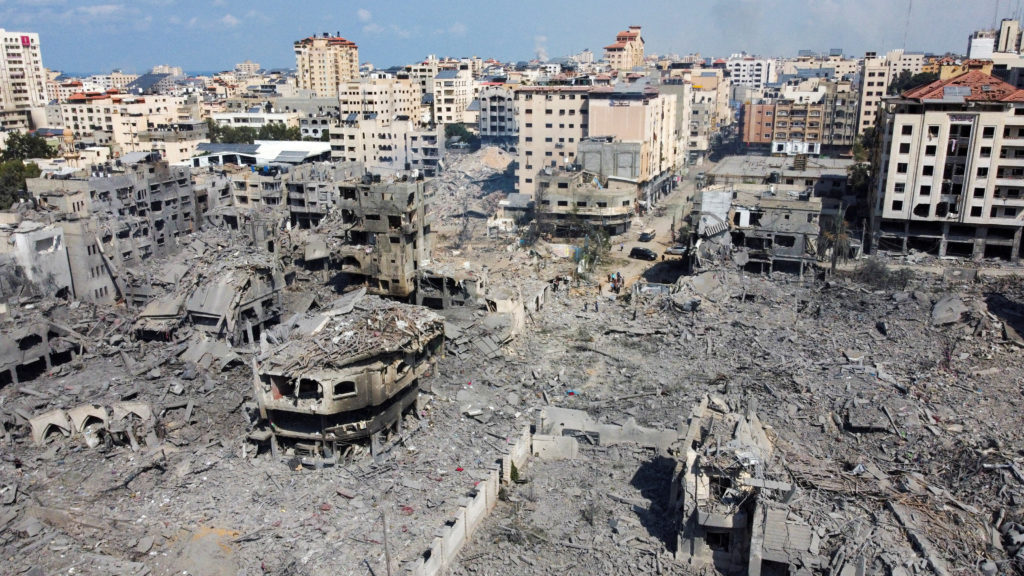Editorial
Military And Boko Haram Ambush

No fewer than 70 Nigerian soldiers were reportedly killed late last month in an ambush on their convoy by Boko Haram insurgents in Borno State.
Some of the eye witness accounts said the terrorists fired rocket-propelled grenades at a lorry carrying troops as it travelled near Gorgi village in the restive north eastern state.
“It was a huge loss, at least, 70 soldiers have perished in the ambush,” one of the officers said.
According to a second officer; “The terrorists specifically targeted a truck loaded with soldiers with RPGs and incinerated the vehicle, killing all on board.
“So far, 70 bodies have been recovered but the toll is certainly more than that as rescue operation is still underway”.
It was also learnt that the convoy had left Maiduguri, the state capital, on its way to launch an offensive on a camp belonging to jihadists affiliated to the Islamic State of West Africa Province (ISWAP).
ISWAP is a splinter group of Boko Haram which has focused on attacking troops, raiding command bases and laying ambush on military convoys.
Reacting to the incident, the Defence Headquarters gave the casualty figure in the ambush as 47 dead and 15 injured soldiers.
As stated by the Coordinator of the Defence Media Operations, Major General John Enenche, “We are in a fluid conflict situation; between March 23 to 24, troops who were on a clearance and consolidation operation which was successful were ambushed and we suffered some casualties.
“After the successful operation, the troops were heading to Buk when Boko Haram insurgents shot at the last vehicle conveying supplies and the bombs exploded, in the process killing some of the soldiers and all the insurgents that mounted the ambush”.
The military spokesman also added that following the surprise attack, fighter jets were quickly deployed and the fleeing insurgents that survived the explosion were neutralised.
Even so, The Tide thinks that the latest Boko Haram ambush on the Nigerian forces is rather one too many, especially in recent times.
In the night of May 13, 2014, a Nigerian military convoy was ambushed as the soldiers were searching for the missing Chibok school girls. This was said to have dampened the morale of the troops who felt that their leadership was sabotaging their efforts against the jihadists. The result was that about 12 soldiers of the Army’s 7 Division mutinied in Maiduguri and came very close to killing their commander. They were later sentenced to death after a court-martial in Abuja.
On Christmas Day in December 2018, it was reported that over 14 military and police personnel were killed by Boko Haram terrorists on escort duty just outside Damaturu, the Yobe State capital.
July 19, 2019, witnessed another ambush by the dreaded terrorist group in which an Army colonel, a captain and three other infantry men lost their lives. The victims were said to be travelling from Maiduguri to Damaturu.
Barely six days into 2020, January 6th to be precise, the Theater Commander of Operation Lafiya Dole, Major General Olusegun Adeniyi, survived a Boko Haram ambush just by the whiskers while he was returning from an engagement in the Jakana area of Maiduguri.
There had been several other instances in-between these where Boko Haram and its associate groups waylaid the Nigerian military, leaving high tolls in their wake.
While we admit that the officers and men of Lafiya Dole deserve praise for their effort so far, it however beats us as to how the insurgents are proving to be the better at intelligence gathering. Indeed, Boko Haram appears to have its informants embedded in the Nigerian security formation. The military should, therefore, investigate itself so as to fish out any sell-outs among its rank and file.
Again, why would the Army move a large contingent of its personnel and materials along a route without first carrying out a reconnaissance of enemy position to ensure safe passage?
The increasing cases of ambush attacks against Nigerian troops in the North East also call to question the Federal Government’s plan to rehabilitate and reintegrate repentant Boko Haram insurgents into society. We fear that the programme might benefit pretenders who may be sworn loyalists of the terrorist group.
Speaking in Hausa on the Voice of America (VOA), a Nigerian soldier, in 2014, claimed that he recognised some Boko Haram fighters as his former military trainers back in Kontagora, Niger State.
The soldier who craved anonymity on the programme also said that they were often ill-equipped to face the fire power of the jihadist insurgents; their commanders having pocketed the bulk of whatever monies that were allocated for equipment purchase.
The war against Boko Haram in Nigeria has lasted far longer than previously envisaged. And this should not be so given what is voted yearly for the nation’s defence and particularly for the fighting of these terrorists.
While the military are wont to downplay any major battlefield successes achieved by the enemy forces, as is almost the practice globally, it has continued to exaggerate its own feats against the insurgents. Often times, Lafiya Dole has been hailed after repelling Boko Haram attacks or miraculously escaping ambushes by the terror group.
Much as this is commendable, it sometimes suggests that it is Boko Haram that is taking the battle to the nation’s soldiers contrary to the government’s claim that the terrorist group has since been technically defeated and is now focusing mainly on soft targets like markets, schools, churches, women and children.
We are not unaware of the success recorded during the Army’s recent testing of some Mines Resistant Ambush Protected (MRAP) vehicles in the region. With such equipment and the Air force’s exclusive right to the airspace, we think that the ambush attacks will begin to reduce, thereby saving the nation such recurring embarrassments.
Editorial
New Federal Varsity In Ogoni

President Bola Ahmed Tinubu has made history by signing into law a bill that establishes the Federal Univer-
sity of Environment and Technology in Ogoni, Rivers State. This significant occasion marks a bold step forward not only for the Ogoni people but also for the Niger Delta region and Nigeria as a whole. It signifies a commitment to education, environmental sustainability, and technological advancement.
For the Ogonis, who have long been impacted by environmental challenges, the university represents a beacon of hope. It is more than just bricks and mortar; it is a symbol of empowerment and a pathway to a brighter future. This development is akin to a seed, planted with the promise of a flourishing harvest of skilled professionals.
The university’s emphasis on environmental technology is extremely important, especially given Nigeria’s climate crisis. Education plays a crucial role in developing sustainable solutions. The institution will provide students with the necessary skills and knowledge to address the environmental challenges affecting the Niger Delta region and beyond. This will have a momentous impact.
Signing the bill, the President praised the Ogoni people’s resilience and unity. He stressed that the institution would mark a “significant milestone in our national journey towards environment justice, education and sustainable development”. Tinubu said the university is a reaffirmation of his administration’s “unwavering commitment to the people of Ogoni, the Niger Delta and the nation as a whole. For decades, the Ogoni people have been at the forefront of fight for environmental restoration and sustainable development, shaping both national and global conversation of these critical issues.
“By signing this bill into law, we are taking a decisive step towards addressing historical grievances and creating new opportunities for learning, growth and prosperity. The university will serve as a centre of excellence, equipping young Nigerians with the knowledge and skill to tackle present environmental challenges, drive clean energy solutions and contribute to our national sustainable economic development.”
We commend President Tinubu for his visionary decision to establish the much-needed institution aimed at fostering development and progress. This initiative is a testament to his commitment to addressing critical social and economic knots and creating opportunities that will benefit the people. The President has laid a solid foundation for sustainable growth while demonstrating a genuine desire to empower and advance the nation’s collective interests.
In addition to his commendable action, we applaud Tinubu for initiating peace talks to bring stability and reconciliation to the troubled area. The decision to engage in constructive dialogue demonstrates a deep understanding of the relevance of inclusive governance and the role of peace in fostering meaningful development. For decades, Ogoni has endured turmoil and neglect, impeding its potential and the return of oil exploration activities.
By opening the door to peaceful negotiations, the President has made a bold and necessary move towards healing fractured relationships and fostering trust among stakeholders. This initiative holds the promise of ensuring that the voices and needs of the Ogonis are heard and respected. We urge all parties involved to seize this golden opportunity for lasting peace and progress. It is only through unity and mutual respect that the full potential of Ogoni, and by extension the nation, can be realised.
As steps are taken to acknowledge and remediate the damage caused by years of oil exploration and production, the Ogonis must reciprocate Mr. President’s gesture by fostering a climate of equanimity and stability. This will ultimately pave the way for the resumption of oil exploration and production. This is not a call to forget the past, but a pragmatic recognition that meaningful change and sustainable development require a collaborative approach.
The Federal Government has a responsibility to ensure that all academic disciplines offered by the new university are fully accredited to maintain the integrity and quality of the school. Without proper accreditation, the institution risks producing graduates who are ill-equipped to compete in the global workforce or contribute substantially to national development. Accreditation serves as a benchmark that ensures programmes meet academic standards and adhere to best practices across various fields of study.
Staff recruitment should be conducted carefully, as the individuals brought into a team can greatly influence an organisation’s performance, culture, and long-term success. The primary focus of recruitment efforts at the university should be on attracting the best candidates who possess the necessary skills, qualifications, experience, and values. Merit should be the guiding principle in decision-making throughout the hiring process, rather than favouritism or personal bias.
For a nation to thrive in the 21st century, a strong higher education system is not only desirable, but essential. Universities serve as the catalysts for innovation, the breeding grounds for future leaders, and the foundations of a knowledge-based economy. The Federal Government must acknowledge this vital role and take intentional actions to properly fund the university in Ogoni and develop infrastructure to ensure it meets international standards. Neglecting this responsibility would put its future prosperity and global competitiveness at risk.
This institution must not suffer the same fate as other federally-owned universities that have been left to decay. That will be a disservice to its purpose and potential. Many government-owned universities in the country have struggled with dilapidated infrastructure, underfunding, insufficient staffing, and interruptions caused by industrial actions due to unpaid wages or poor working conditions. These challenges have led to declining standards in education, putting both students and staff at a disadvantage. The Ogoni University must not be another victim of this worrying trend.
Editorial
HIV, Transiting From Donor Dependence

The initial announcement by United States President, Donald Trump, to cut funding for international
HIV/AIDS initiatives sent shockwaves through the global health community. In Nigeria, a country facing a significant HIV/AIDS burden, the potential consequences were dire. However, the subsequent waiver granted by the administration has provided a lifeline for the millions of Nigerians who rely on the President’s Emergency Plan for AIDS Relief (PEPFAR) for their treatment and support.
PEPFAR has been an important partner in Nigeria’s fight against HIV/AIDS. Since its inception in 2003, PEPFAR has committed more than $7.8 billion to the country, catering to approximately 90 per cent of HIV treatment requirements. With this funding, Nigeria has been able to enhance its HIV prevention, treatment and support services and has witnessed a reduction in HIV/AIDS deaths.
The waiver granted by the Trump administration guarantees that PEPFAR’s life-saving medicines and medical services will continue to reach the needy. Antiretrovirals (ARVs) are the most common type of medicine used to treat HIV and reduce the virus’ spread. Through the provision of ARVs, PEPFAR helps prevent the spread of HIV and enhances the quality of life of those with the condition.
Although Nigeria was recently exempted from the requirement, the signs are evident: the country has to graduate from dependence on donor funds for its HIV/AIDS control programmes. Over the years, partners including the U.S. government have been central to the provision of treatment to people living with the virus. However, it is time for Nigeria to own its national response to HIV/AIDS.
Nigeria’s HIV/AIDS burden remains critical, accounting for 10 per cent of the global total. In 2023 alone, there were 75,000 new infections and 45,000 HIV-related deaths. The battle against Mother-to-Child Transmission remains challenging, with only 35 per cent of the target 75 per cent being met. Nearly 1.7 million Nigerian children have been orphaned due to HIV. Vulnerable populations, especially women and children, continue to disproportionately suffer.
To transition away from donor dependence, a multifaceted approach is necessary. Firstly, the country must increase its domestic financing for HIV/AIDS programmes. This can be accomplished through innovative funding mechanisms, such as leveraging public-private partnerships and exploring local revenue sources. Secondly, the government needs to strengthen its healthcare system to ensure equitable access to testing, treatment, and care. This involves expanding access to antiretroviral drugs, investing in community-based models, and addressing the stigma associated with HIV.
Thirdly, Nigeria must prioritise prevention efforts. This entails promoting condom use, providing comprehensive sexual education, and increasing awareness about the risks and modes of transmission. By focusing on prevention, the country can decrease the incidence of HIV infections and ultimately lessen the burden on its healthcare system.
Finally, Nigeria should develop a sustainable human resource strategy for its HIV/AIDS response. This involves training and equipping healthcare workers, engaging community volunteers, and empowering people living with HIV to advocate for their rights. A well-trained workforce is essential for delivering high-quality services and ensuring the long-term success of the response.
The transition beyond donor dependence is a complex but necessary journey for the country. By increasing domestic financing, strengthening healthcare systems, prioritising prevention, and investing in its human resources, the country can create a sustainable and effective response to HIV/AIDS. Also, the government should consider alternative funding mechanisms, such as increased domestic funding, public-private partnerships, and philanthropic initiatives. The time to act is now, for the well-being of present and future generations.
Nigeria’s National Agency for the Control of AIDS (NACA) has made momentous strides in combating HIV/AIDS, including expanding access to testing, treatment, and education. However, challenges persist, hindering the effectiveness of these efforts.
One major obstacle is limited access to healthcare facilities, particularly in rural areas. This impedes timely diagnosis and treatment, reducing the likelihood of optimal outcomes for those living with HIV. Additionally, stigma surrounding the disease remains a formidable barrier, preventing individuals from seeking testing and care. Inadequate awareness campaigns further contribute to low testing rates and delayed diagnosis.
Addressing these challenges requires concerted action by the government and stakeholders. Allocation of adequate funding is crucial to expand healthcare infrastructure and ensure the availability of essential services. Moreover, targeted interventions to reduce stigma and promote awareness are vital for increasing testing and early detection.
Collaboration between civil society organisations and grassroots movements is also essential for advocating for protection of HIV funding. Advocacy campaigns can mobilise public support and pressure lawmakers to prioritise the fight against HIV/AIDS. By addressing these challenges and ensuring sustainable funding, Nigeria can depend less on donor countries, drastically reduce HIV transmission, and provide the necessary care to those affected by the disease.
Editorial
Israel-Gaza War: Sustaining The Ceasefire

-

 Opinion2 days ago
Opinion2 days ago2050: Expectations For Poultry Enterprise
-

 Maritime2 days ago
Maritime2 days agoLASWA Deploys Data Management Tech In Water Transport
-

 Oil & Energy2 days ago
Oil & Energy2 days agoDrought Dims Hydropower’s Promise
-

 Business2 days ago
Business2 days agoFirm Unveils Solutions To Oil Logistics Challenges
-

 News2 days ago
News2 days agoPolice Rescue Kidnapped Victim, Recover Stolen Vehicle
-

 Sports2 days ago
Sports2 days agoEaglets Not In CAF’s U-17 AFCON Plans
-

 News2 days ago
News2 days agoPoliceman Commits Suicide In Niger
-

 Politics2 days ago
Politics2 days agoPrioritise Citizens’ Wellbeing To Avoid Dire Consequences, Don Warns Political Elite

